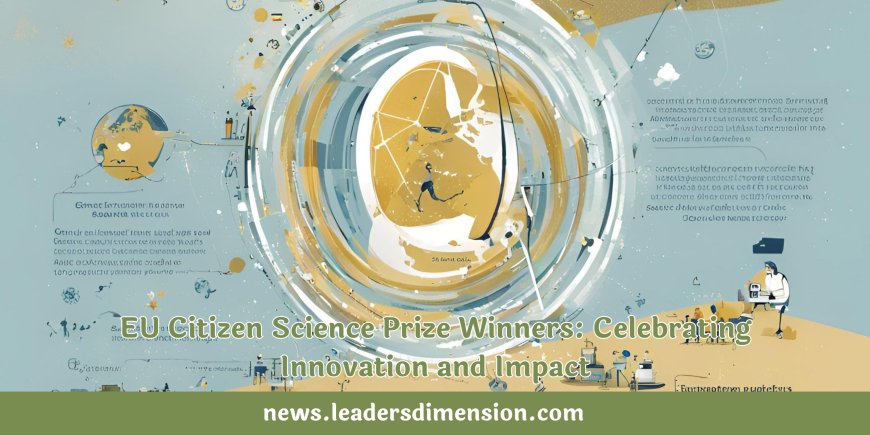EU Citizen Science Prize Winners: Celebrating Innovation and Impact
Discover the 2024 EU Prize for Citizen Science winners. The INCREASE project took the grand prize for seed preservation, CoAct for Mental Health won the Digital Communities prize for improving mental health care with digital tools, and SeaPaCS earned the Diversity & Collaboration prize for combating marine pollution through citizen science.

Introduction
The 2024 EU Prize for Citizen Science has highlighted three exemplary projects that showcase the power of community involvement in scientific research and innovation. These projects address critical issues such as seed preservation, mental health care, and marine pollution, demonstrating the significant impact that citizen science can have on solving global challenges. This article delves into the achievements of the INCREASE project, CoAct for Mental Health, and SeaPaCS, exploring how each initiative harnesses the collective efforts of citizens to drive meaningful change.
The INCREASE Project: Seed Preservation Through Citizen Science
Overview
The grand prize of the 2024 EU Prize for Citizen Science was awarded to the INCREASE project, an initiative focused on preserving agricultural biodiversity through seed conservation. This project emphasizes the importance of genetic diversity in crops, which is crucial for food security and environmental resilience. By engaging citizens in the process of seed preservation, INCREASE aims to protect and enhance the genetic resources of Europe's agricultural heritage.
Project Goals and Achievements
INCREASE, which stands for Intelligent Collections of Legumes for Climate Resilient Agriculture, focuses on legumes such as beans, lentils, chickpeas, and lupins. These crops are vital for sustainable agriculture due to their ability to fix nitrogen in the soil, reducing the need for chemical fertilizers. The project's primary goals include:
- Preserving Genetic Diversity: By collecting and conserving a wide variety of legume seeds, INCREASE aims to safeguard genetic diversity, which is essential for developing resilient crop varieties.
- Promoting Citizen Participation: INCREASE involves citizens in the collection, cultivation, and sharing of legume seeds. This participatory approach not only raises awareness about the importance of seed conservation but also empowers individuals to contribute to scientific research.
- Enhancing Climate Resilience: Through research and breeding programs, INCREASE seeks to develop legume varieties that can withstand the challenges posed by climate change, such as drought and disease.
The project's success is evident in its extensive network of participants across Europe. Citizens are provided with seed kits and are guided on how to cultivate and document their plants. The data collected by participants is then used to inform scientific studies and breeding programs, creating a robust database of legume varieties.
Impact on Agricultural Biodiversity
The INCREASE project has made significant strides in preserving agricultural biodiversity. By involving citizens in the conservation process, it has created a sense of ownership and responsibility towards genetic resources. This community-driven approach not only enhances the project's reach but also ensures the sustainability of its efforts. The project's innovative use of digital platforms to coordinate and document citizen participation has set a new standard for citizen science initiatives.
CoAct for Mental Health: Improving Care with Digital Tools
Overview
The Digital Communities prize was awarded to the CoAct for Mental Health project, which leverages digital technologies to enhance mental health care. CoAct addresses the pressing need for accessible and effective mental health services, particularly in underserved communities. By utilizing digital tools, the project aims to improve mental health outcomes and reduce the stigma associated with mental illness.
Project Goals and Achievements
CoAct for Mental Health focuses on several key areas to improve mental health care:
- Community Engagement: The project actively involves community members in the design and implementation of mental health interventions. This participatory approach ensures that the solutions are culturally relevant and address the specific needs of the community.
- Digital Platforms: CoAct utilizes digital platforms to provide mental health resources, including self-help tools, online counseling, and peer support networks. These platforms are designed to be easily accessible and user-friendly, making mental health care more available to those in need.
- Research and Evaluation: The project conducts rigorous research to evaluate the effectiveness of its interventions. By collecting and analyzing data on mental health outcomes, CoAct continuously improves its strategies and expands its impact.
Impact on Mental Health Care
CoAct for Mental Health has had a profound impact on the communities it serves. By reducing barriers to access, the project has made mental health care more inclusive and equitable. The use of digital tools has also enabled CoAct to reach a broader audience, including individuals who may not seek traditional mental health services due to stigma or lack of resources.
One of the project's notable achievements is its success in fostering peer support networks. These networks provide a safe space for individuals to share their experiences and receive support from others who understand their challenges. This sense of community is crucial for improving mental health outcomes and promoting overall well-being.
SeaPaCS: Combating Marine Pollution Through Citizen Science
Overview
The Diversity & Collaboration prize was awarded to SeaPaCS (Sea Pollution Control System), a project dedicated to addressing marine pollution through citizen science. SeaPaCS engages communities in monitoring and reducing pollution in coastal and marine environments. By leveraging the collective efforts of citizens, the project aims to protect marine ecosystems and promote sustainable practices.
Project Goals and Achievements
SeaPaCS focuses on several key areas to combat marine pollution:
- Pollution Monitoring: The project involves citizens in the collection of data on marine pollution, including plastic waste, chemical contaminants, and other pollutants. This data is used to identify pollution hotspots and track changes over time.
- Public Awareness: SeaPaCS conducts educational campaigns to raise awareness about the impact of marine pollution and the importance of conservation. These campaigns encourage individuals to reduce their use of single-use plastics and adopt more sustainable behaviors.
- Policy Advocacy: The project uses the data collected by citizens to advocate for stronger environmental policies and regulations. By providing evidence of pollution, SeaPaCS helps drive policy changes that protect marine environments.
Impact on Marine Conservation
SeaPaCS has made significant contributions to marine conservation through its citizen science approach. By involving local communities in pollution monitoring, the project has generated a wealth of data that is invaluable for scientific research and policy-making. This data-driven approach has led to tangible improvements in marine ecosystems, such as the reduction of plastic waste in certain areas and the implementation of conservation measures.
The project's emphasis on public awareness and education has also been instrumental in changing behaviors and attitudes towards marine conservation. Through workshops, community events, and social media campaigns, SeaPaCS has reached a wide audience and inspired many individuals to take action to protect the oceans.
Conclusion
The 2024 EU Prize for Citizen Science has highlighted the remarkable achievements of the INCREASE project, CoAct for Mental Health, and SeaPaCS. These projects demonstrate the power of citizen science to address critical issues and drive positive change in society. By engaging citizens in scientific research and innovation, these initiatives have not only achieved significant impact in their respective fields but have also fostered a sense of community and shared responsibility.
As we look to the future, it is clear that citizen science will continue to play a vital role in addressing global challenges. The success of these projects serves as an inspiration for future initiatives, showing that when individuals come together to contribute their knowledge and efforts, they can make a profound difference in the world.
References
- European Commission. "The 2024 EU Prize for Citizens Science goes to three projects addressing marine pollution, agricultural biodiversity, and mental health." European Commission. Accessed June 27, 2024.
- INCREASE Project. "Intelligent Collections of Legumes for Climate Resilient Agriculture." INCREASE Project. Accessed June 27, 2024.
- CoAct for Mental Health. "Collaborative Action for Improving Mental Health Care." CoAct for Mental Health. Accessed June 27, 2024.
- SeaPaCS. "Sea Pollution Control System: Combating Marine Pollution through Citizen Science." SeaPaCS. Accessed June 27, 2024.

 LD Web Desk
LD Web Desk 